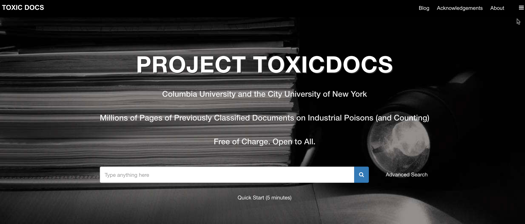Research Tools: ToxicDocs Database Levels the Playing Field for Efforts to Prevent Toxic Exposures
From Columbia University:
Johnson & Johnson, the world’s largest health care products maker, is in the midst of more than 10,000 lawsuits claiming that its iconic baby powder is linked to cancer. In July, a verdict by a Missouri jury awarded 22 women $4.6 billion in a lawsuit against the company, supporting their claim that talcum powder caused their ovarian cancer. The case is under appeal.
At issue in that litigation, as in many other cases, is whether the talc-based powder contains asbestos, a known carcinogen, and if the company was aware of the alleged cancer risk for decades and sought to suppress evidence rather than warn consumers.
Now, a powerful resource at Columbia University has opened areas of inquiry about the corporate and regulatory histories of these companies. ToxicDocs is a database of some 20 million once-secret industry and trade association documents concerning the health hazards of toxic chemicals, such as asbestos, lead and polychlorinated biphenyls (PCBs.)
“This material provides a peek into the government agencies responsible for regulating toxic chemicals and the inner workings of major firms that manufactured and sold toxic substances and the products containing them,” said David Rosner, the Ronald H. Lauterstein Professor of Sociomedical Sciences at Columbia Mailman School of Public Health and a professor in the Department of History. “It is the right of the public to know which industries knowingly profited from public health hazards.”
ToxicDocs officially launched in February 2018, and is free and open to all. Its collection consists of discovery documents from myriad lawsuits that were made public once they were introduced in court but were extremely hard for the general public to access. The data includes internal memos, unpublished scientific studies, planning reports for public relations campaigns, meeting minutes and presentations—some dating back to the 1920s—related to the introduction of new products and chemicals into workplaces and commerce. The companies represented in the database range from a small brake manufacturer to multinational giants like J&J and Monsanto.
[Clip]
“ToxicDocs gives consumers, journalists, scientists, researchers, lawyers, policymakers and community activists a strong, evidence-based tool for raising questions about industrial firms’ behavior,” said [Merlin ] Chowkwanyun [the Donald H. Gemson Assistant Professor of Sociomedical Sciences at Mailman, who spearheaded the effort to index and digitize the materials] whose research centers on the history of community health, racial inequality and social movements. The archive also guards against conspiracy theories that claim that government or industry is purposely poisoning the population, he added.
With a recent $500,000 grant from the National Science Foundation, Chowkwanyun is now in the midst of building a software update that will enhance navigation and provide users with tools to extract patterns in the data.
Direct to ToxicDocs Database
Learn More About ToxicDocs
Direct to ToxicDocs Blog
Filed under: Data Files, Funding, News, Patrons and Users, Reports
About Gary Price
Gary Price (gprice@gmail.com) is a librarian, writer, consultant, and frequent conference speaker based in the Washington D.C. metro area. He earned his MLIS degree from Wayne State University in Detroit. Price has won several awards including the SLA Innovations in Technology Award and Alumnus of the Year from the Wayne St. University Library and Information Science Program. From 2006-2009 he was Director of Online Information Services at Ask.com.



